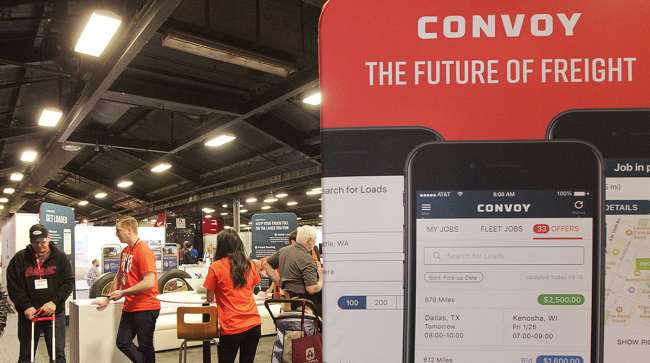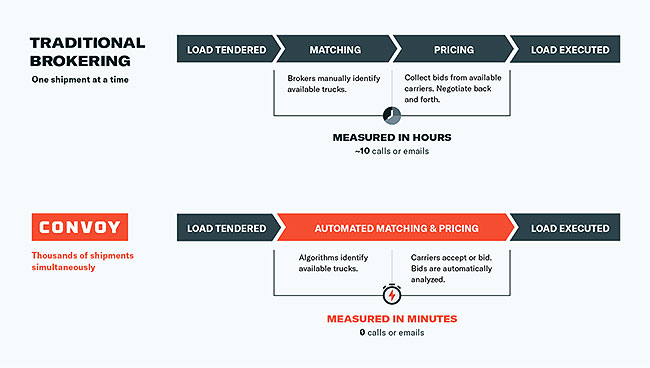Staff Reporter
Convoy Says AI Now Fully Runs Its Load-Matching and Brokering

[Stay on top of transportation news: Get TTNews in your inbox.]
Services that rely on artificial intelligence to handle financial and broker-related transactions are making inroads in trucking, in some cases taking over manual processes that for years relied on human hands. And it’s an evolution that experts say can help trucking address a key challenge it’s facing: managing and analyzing all of the data the industry is generating.
In September, third-party logistics provider Coyote Logistics of Chicago, a UPS Inc. subsidiary, said in a study titled Tech + Humanity that a balance of 60% technology and 40% human expertise is ideal for optimally managing supply chains.
Have you downloaded Coyote's Technology + Humanity research report? Get access to our original research at no cost now: https://t.co/ab9WYEpt9U #CoyoteInsights pic.twitter.com/auXDGrIkfW
— Coyote Logistics (@CoyoteLogistics) October 2, 2019
Last month, Seattle-based digital freight network Convoy said it has achieved 100% automation of the load-brokering process, adding automated load pricing to the automated load-matching service it announced in February 2019.
Yet humans need not worry about being displaced, as this growth of technological influence will ultimately make work easier for people, said Christina Bottis, Coyote chief marketing officer, noting that human expertise is just as valuable — and necessary — as ever before.
“While technology certainly has a critical role in the supply chain, we need the skilled people who can use and advance the technology to make it valuable for our customers,” Bottis told Transport Topics via email. “Coyote’s Tech + Humanity study found that human expertise is irreplaceable in many of our customers’ most crucial supply chain tasks, such as communicating with customers and 3PL partners, and solving delivery problems.”
The study analyzed 13 tasks in terms of which are best suited for human expertise, which can be optimized with technology and which require a combination of both. The study, conducted in partnership with third-party research firm Martec, found that human expertise is necessary for creative decision-making and strategic thinking, such as communicating with customers and resolving shipment and delivery problems. However, it also found that automation can strengthen operational functions such as managing inventory and booking shipments.

Ismail
Automation of longstanding manual booking processes is what Convoy’s service promises, according to Ziad Ismail, the company’s chief product officer.
Ismail told Transport Topics that automated brokering replaces the back-and-forth of negotiating and booking loads with phone calls and emails. Using AI, Convoy’s network matches its network of carriers with machine-learning models to automate the process of matching and pricing a truck to a load, Ismail said.
Convoy, which focuses on truckload freight and usually dry van and refrigerated loads, said the machines learn pricing models over time and, as the AI reviews more shipment data, pricing becomes more accurate.
“If you want to be ahead of the curve, you have to use (AI),” said Hayden Cardiff, founder and CEO of Idelic of Pittsburgh. “Even on financial decisions.”

Idelic offers AI products that allow safety managers to automate compliance processes, integrate systems and gain insight and analytics on drivers, terminals and overall operations. Cardiff said his firm’s thinking software can recommend proactive actions before accidents happen.
Cardiff told TT that the “data flood” that transportation companies face is real. And many have already turned to AI to help, even in financial areas.
“Some of the biggest AI projects look at pricing,” said Cardiff. “When you have the ability to understand the components, it gives them much more confidence moving ahead with decisions.”
Want more news? Listen to today's daily briefing:


